Woman Contemplates If She's At Fault For Choosing Her Dog Over Her Boyfriend's Kid
If you were to pick between your partner and your dog, which one would you choose? Some people are willing to give up their dog for their partner.
However, we wouldn't be surprised if you chose your dog over your partner. In fact, it's quite common to do so.
In a survey by OnePoll, 86% admitted that they would say goodbye to a significant other who didn't get along well with their pet. Moreover, 16% of married people prefer to celebrate the birthdays of their dogs rather than their partner's.
Such situations are also reported in the news. Express UK once reported on a woman who was made to choose between her dog and her 25-year marriage.
She kept the dog, and her husband left. Even ultimatums cannot change the minds of people who love their dogs.
The situation we're examining today is quite similar. A Redditor with the username OpenRip7059 sought the judgment of the "Am I The A**hole?" subreddit.
She has a daughter and owns a husky that her boyfriend of five years is fond of. However, there's a problem.
They discovered that the boyfriend's son is afraid of dogs. Consequently, he asked the woman to get rid of her dog, to which she disagreed.
For her, getting rid of the dog is akin to killing it. The poor floof has epilepsy and only has a couple more years to live.
The original poster is ready to move in with her partner soon.
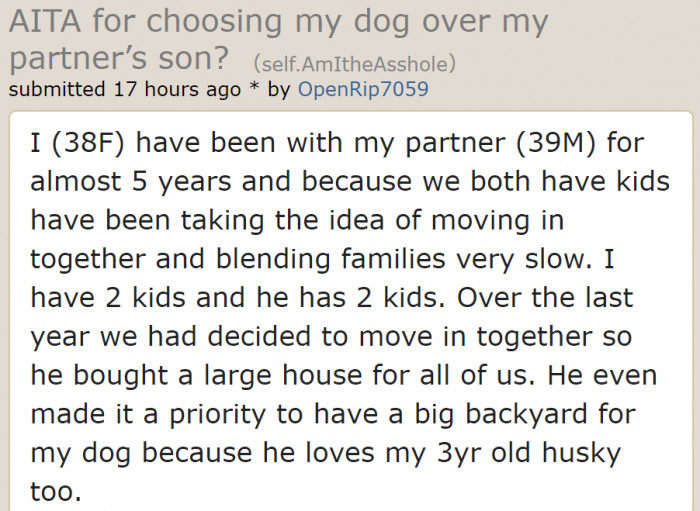
The woman's boyfriend's son is afraid of dogs.
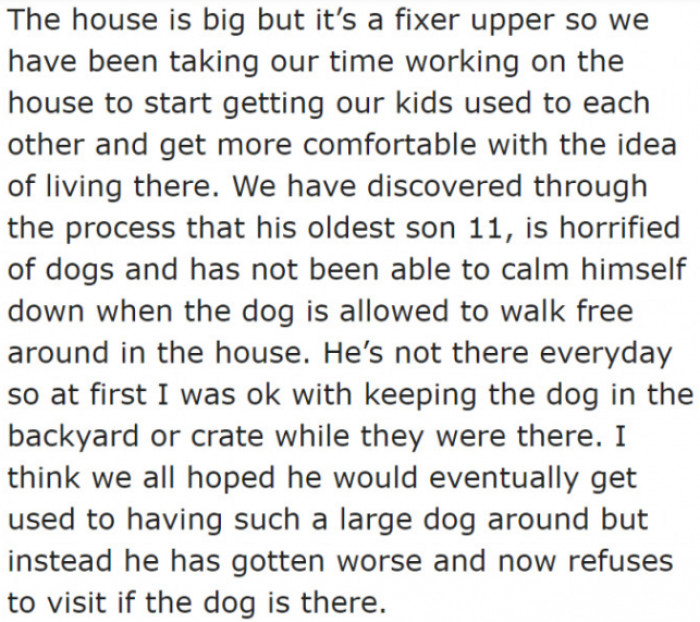
The original poster (OP) can't let go of the dog even if her partner told her to.

The Psychology of Pet Preference
Dr. Amanda White, a child psychologist, highlights the complexities surrounding pet preferences in blended families. When a child has a fear of dogs, it can pose significant challenges in family dynamics, particularly when one parent prioritizes their pet's presence.
Research has shown that children's fears often stem from previous traumatic experiences or lack of exposure, making it crucial for parents to approach these situations sensitively.
Navigating Pet and Child Relationships
The dilemma of choosing between a pet and a child can bring underlying values and fears to the surface. Research in developmental psychology indicates that children's fears, particularly of animals, can stem from various sources, including early experiences, social learning, and parental attitudes. A child's fear of dogs could reflect their past interactions or even the parents' own apprehensions.
Addressing these fears requires a nuanced understanding of both the child's emotional state and the responsibilities of pet ownership, which can be quite complex.
She suggested delaying the move-in since, after all, the dog won't last that long.
But the boyfriend felt that she was prioritizing the dog over his son's needs. In the end, the woman asked the AITA community if it was wrong of her to keep the dog.
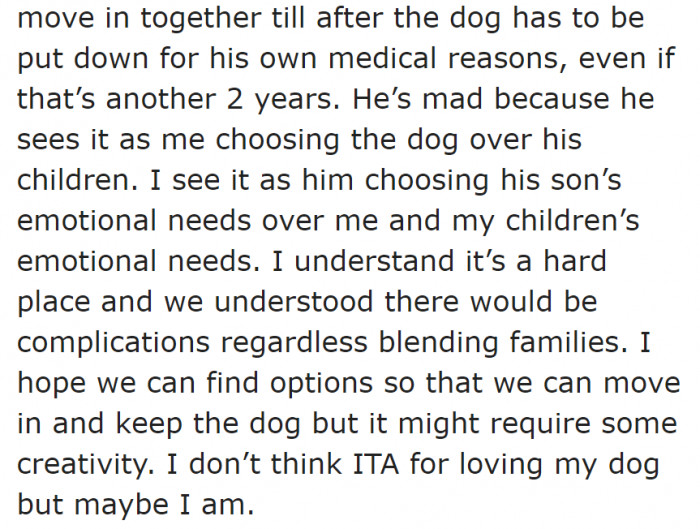
The OP explains further.
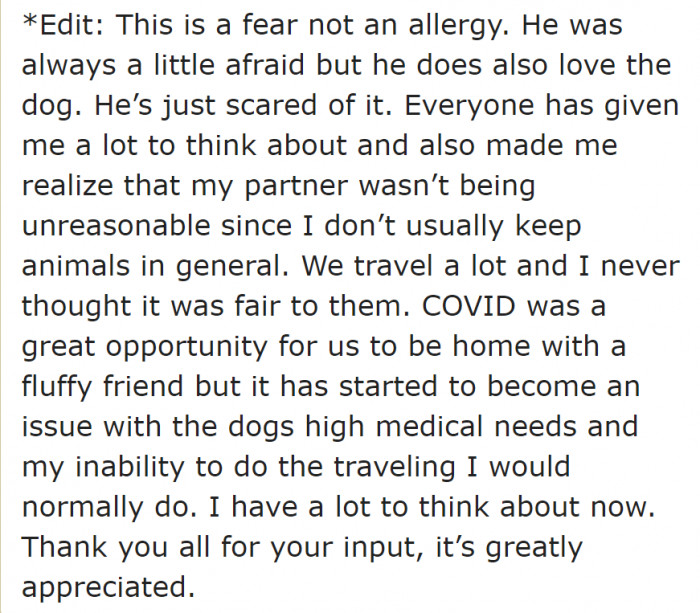
For this Redditor, the boyfriend is brewing unnecessary drama.

Behavioral experts suggest that gradual exposure to dogs in a controlled environment can help alleviate fears. Using positive reinforcement techniques, parents can help children develop a more comfortable relationship with pets, ultimately fostering a harmonious home environment.
It's essential to create a safe space for the child, allowing them to set boundaries while also introducing them to the pet in a gradual, supportive manner.
Experts in family dynamics suggest that open communication about fears and expectations is crucial in such situations. When children express fears, it may be beneficial for parents to engage in discussions that validate those feelings while also exploring gradual exposure to the pet in a controlled manner. Studies show that systematic desensitization can effectively reduce fear responses in children, allowing them to build a more positive association with dogs over time.
This process can also facilitate a sense of security for both the child and the pet, creating an environment of understanding.
That's right! Dog is family.
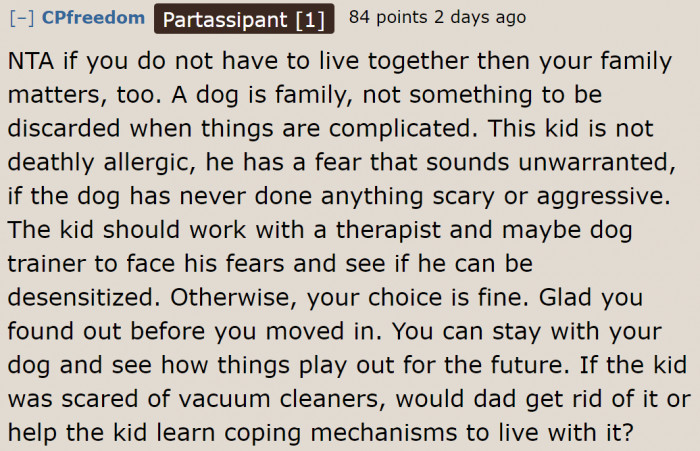
The OP is appreciative of the responses.

Should the son go to therapy?
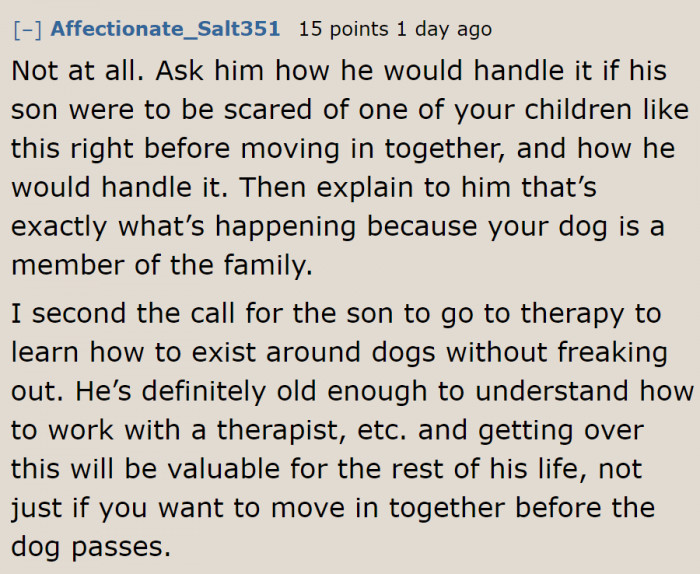
Fostering Understanding and Compassion
In family dynamics, understanding each member's emotional needs is vital. When one partner prioritizes their pet over a child's fear, it can create feelings of neglect or disregard for the child's emotional well-being. Couples are encouraged to engage in open conversations about each other's needs and fears.
According to studies published in the Journal of Child Psychology, fostering empathy and understanding is crucial in blended families. When both partners are willing to listen and validate each other's feelings, it can lead to more effective conflict resolution.
Balancing Family Dynamics with Pet Ownership
Integrating a pet into a family where a child has fears can be challenging but also rewarding. Research indicates that pets can contribute positively to children's emotional development when managed appropriately. According to studies published in the Journal of Child Development, children with pets often show increased empathy, responsibility, and social skills.
However, ensuring that the environment is safe for the child is paramount; this requires careful planning and consideration of the child's needs.
Another user thinks that therapy is the best idea for the boy who's afraid of dogs.

Moving in should not involve heartbreak.
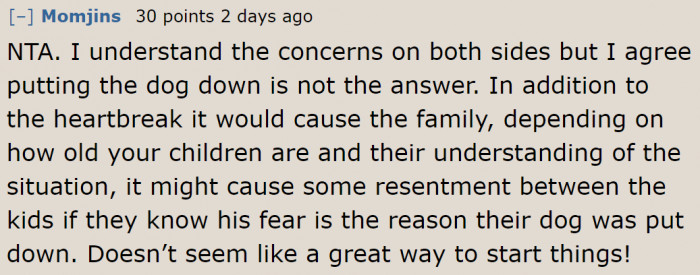
This Redditor is neutral.

To create a harmonious living situation, families may consider establishing clear boundaries and guidelines for interactions between the child and the dog. This can include supervised visits and teaching the child safe ways to engage with the pet. Research supports that providing education about pet behavior can help demystify the animal for the child, reducing fear and fostering a sense of agency.
Ultimately, creating a supportive environment where both the child's needs and the pet's needs are respected can lead to a positive outcome for all involved.
The best solution here is to wait.
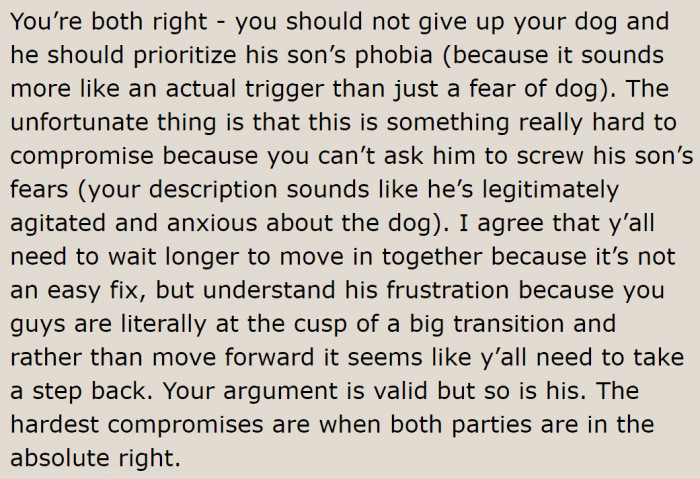
They're doing themselves a favor by delaying their plans.
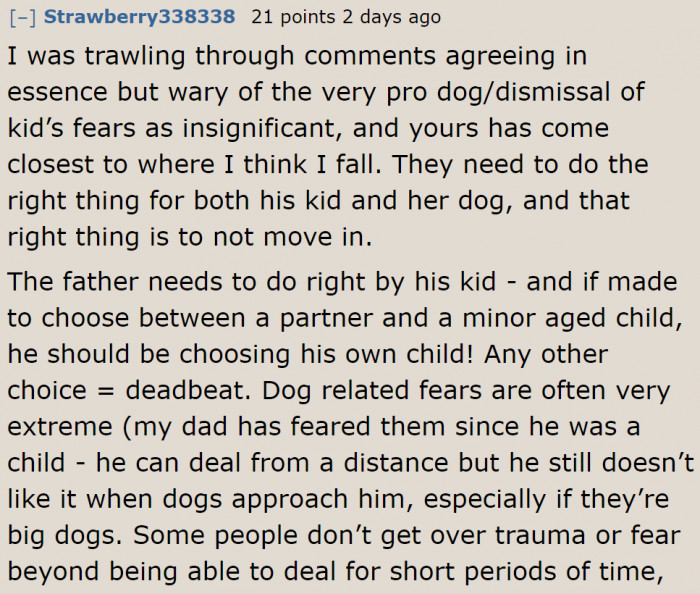
Therapy isn't always a solution.
Once they move in, they shouldn't get a dog. That's the solution.
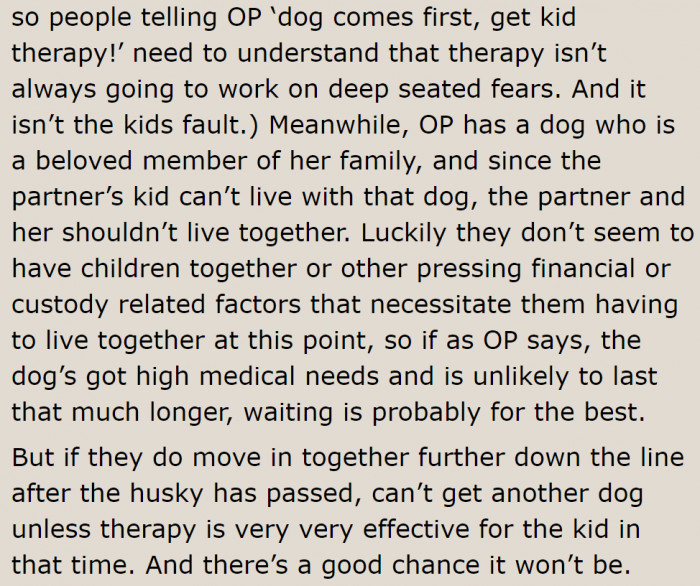
Fears are normal, which is why some Redditors agree that therapy isn't needed.
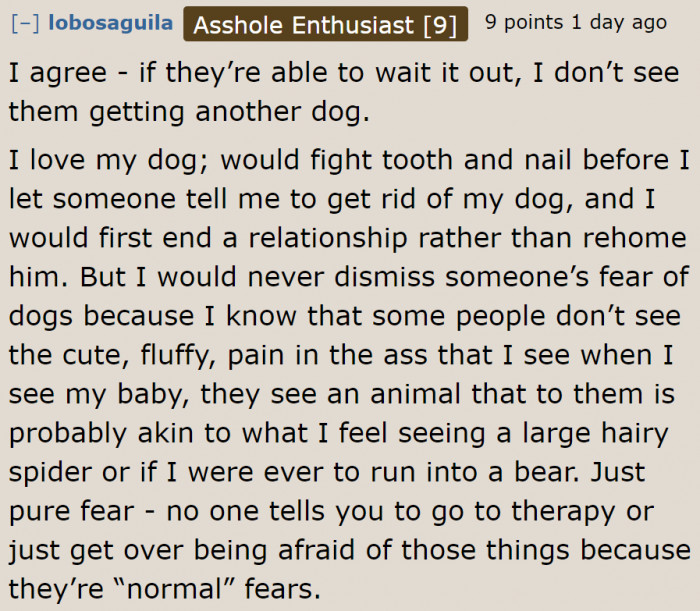
They're dealing with a challenging situation. No one's at fault.
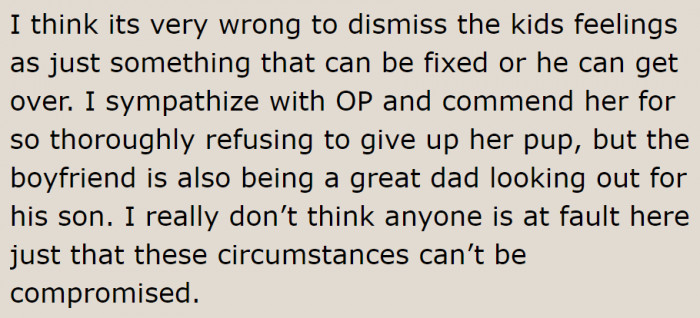
The man should've paid more attention to his son.

A Redditor wanted more info before making the judgment.

And the OP responded
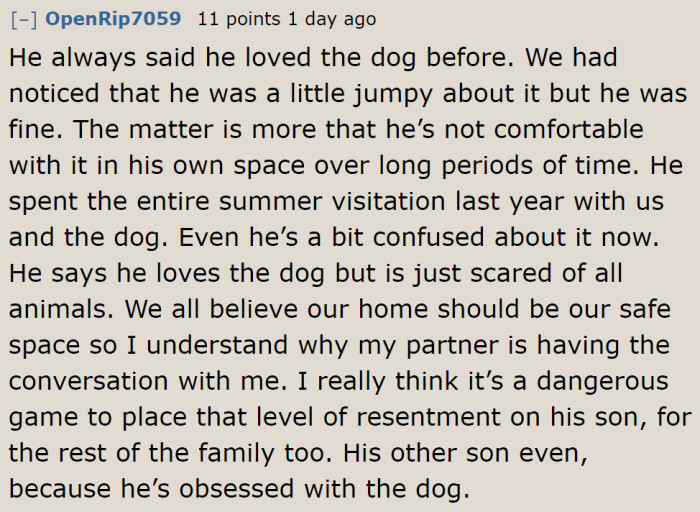
They can always try to address the son's fear of dogs.
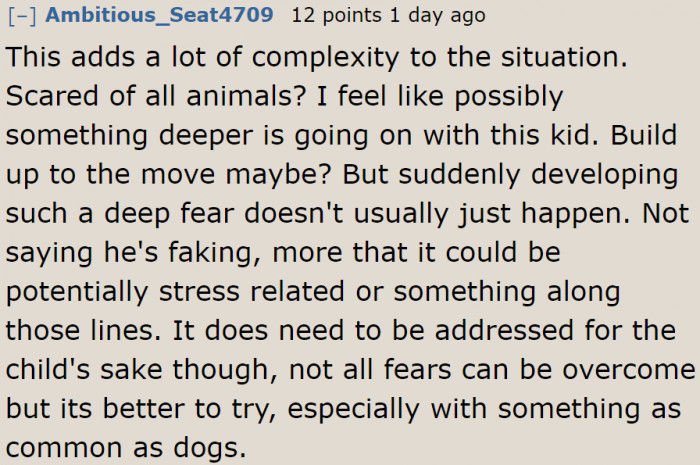
It's just bad timing.
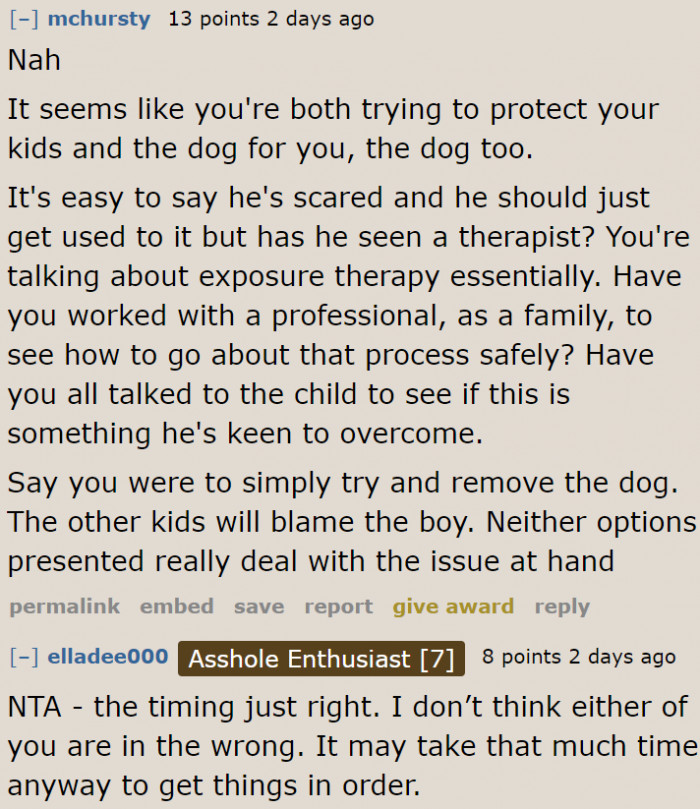
Some users wanted to know the reason behind the boy's fears.
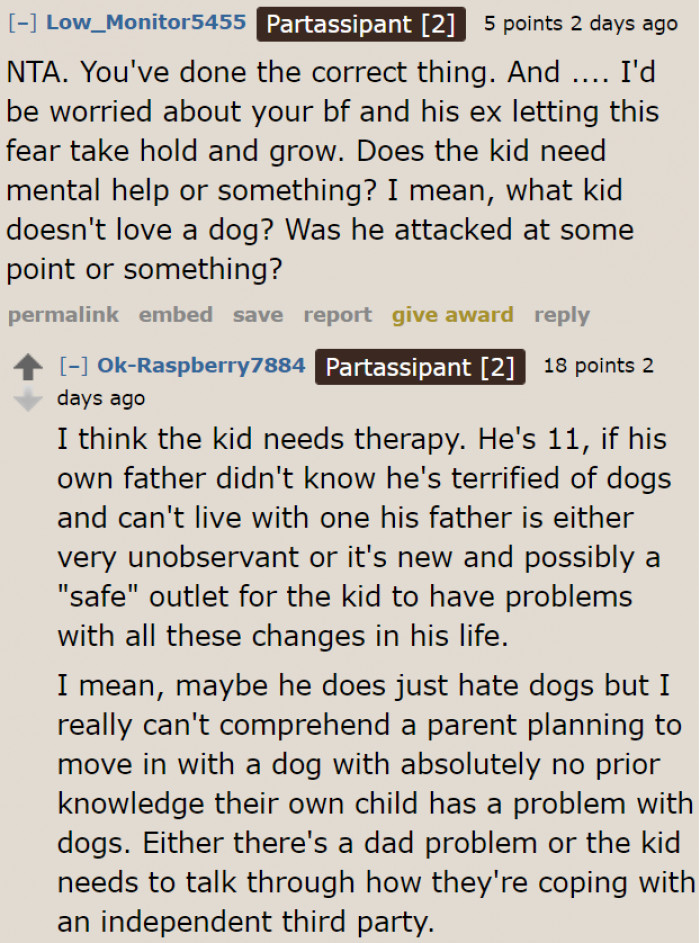
Choosing to delay the plans is indeed equivalent to considering the needs of both the son and the dog.
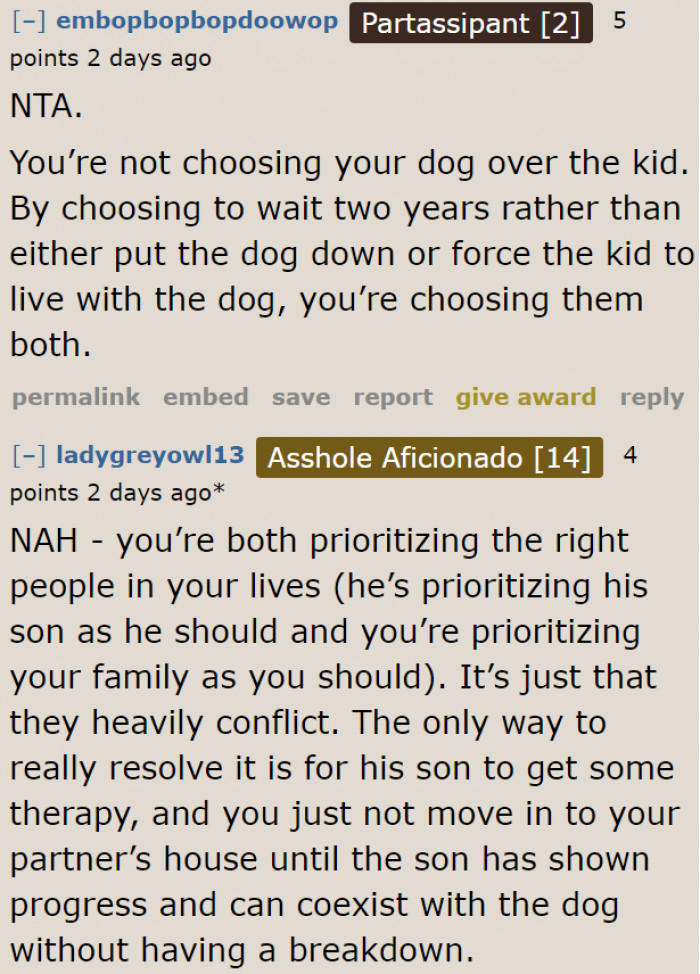
This is a possibility.
It's either that the dad realized too late or the boy doesn't want to move in and is creating a reason.
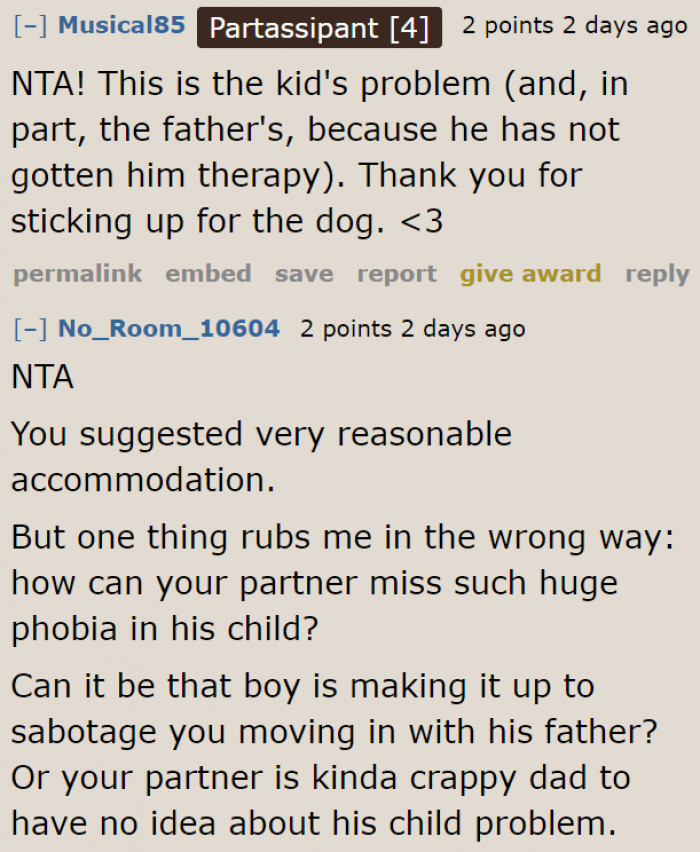
While some agree that she isn't in the wrong, others believe that no one's at fault.
The boyfriend needs to understand that waiting it out is better for both their families. By delaying the move, the dog can spend the rest of its life peacefully with the family it loves, and the son doesn't have to deal with his fears in his own home.
Psychological Analysis
This situation highlights the intricate balance between pet ownership and the emotional needs of children. It's essential to navigate these challenges with sensitivity, recognizing that children's fears can be addressed through gradual exposure and open dialogue. By fostering understanding and communication, families can work toward creating a positive living situation for both pets and children.
Analysis generated by AI
Analysis & Alternative Approaches
Navigating the complexities of pet ownership in families with children requires a thoughtful approach to both emotional needs and fears. According to research in developmental psychology, addressing these concerns through open communication and gradual exposure can foster healthier relationships.
By respecting both the child's feelings and the responsibilities of pet ownership, families can create a supportive environment that benefits everyone.
Analysis & Alternative Approaches
Ultimately, navigating the complexities of pet ownership in blended families requires empathy, communication, and a commitment to understanding each other's fears and needs. As highlighted by psychological research, recognizing and validating these emotional experiences can foster healthier family dynamics. By working together, parents can create a nurturing environment that respects both the child's fears and the pet's role in the family.



